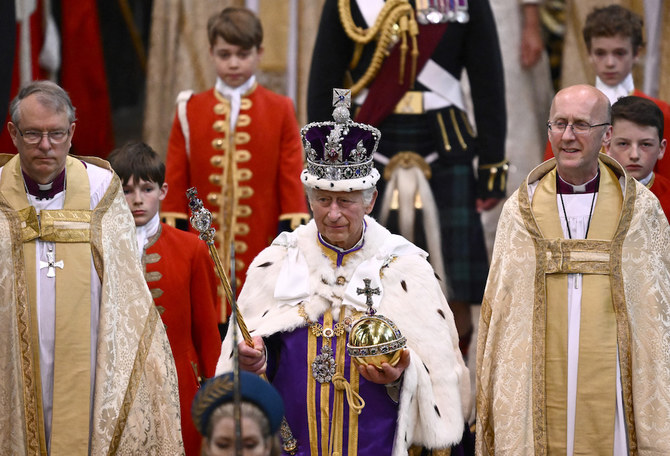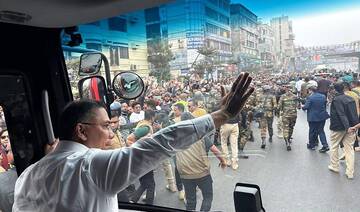LONDON: King Charles III was crowned at Westminster Abbey in London on Saturday in a ceremony replete with ancient traditions, regal pomp and circumstance and a sprinkling of the modern.
The grand old church, which has been the site of coronations of 39 monarchs before Charles, was packed to the rafters with 2,000 attendees as international dignitaries and nobles mixed with specially invited members of the public.
Among the guests were Arab leaders, US First Lady Jill Biden, French President Emmanuel Macron, Canadian Prime Minister Justin Trudeau, UK Prime Minister Rishi Sunak as well as seven former premiers who joined the celebration alongside celebrities including Judi Dench, Emma Thompson and Lionel Richie.
They were among the lucky few present in the abbey as Charles was anointed with oil from the Mount of Olives in the Holy Land and presented with an orb, swords and scepters, before Archbishop of Canterbury Justin Welby placed the St. Edward’s Crown, bedecked with more than 400 precious stones, on the monarch’s head. Trumpets blared out the anthem, and gun salutes were fired in cities across the UK.

The set-piece coronation was the first in Britain in 70 years, and only the second in history to be televised. Charles was the 40th reigning monarch to be crowned at Westminster Abbey since King William I in 1066. (AFP)
Alongside the ancient rites, Charles had worked actively to make his big day as inclusive and reflective of the Britain he now rules over as possible, and in a break from tradition, representatives of the Muslim, Buddhist, Hindu, Jewish and Sikh faiths were involved for the first time.
The usually Anglican ceremony saw Charles, robed in crimson and cream, swear on a Bible that he was a “true Protestant,” but a preface was added to the oath to say that the Church of England would seek to “foster an environment where people of all faiths and beliefs may live freely.”
The reading from the King James Bible was made by Sunak, Britain’s first Hindu leader, and a gospel choir performed a newly composed “Alleluia,” while for the first time, female clergy took part in the ceremony.
The cost of the ceremony — the exact figure will be released by Buckingham Palace after the event — had drawn criticism from some quarters of British society, who questioned the timing of a coronation amid a cost-of-living crisis, during which Britons have struggled to pay energy bills and buy food.
Charles, however, has made it his mission to streamline the royal family for the 21st century and offer taxpayers “value for money.” His coronation was markedly shorter than the 1953 extravaganza of his mother, Queen Elizabeth II, with fewer guests and an abbreviated procession.
And while much of the reverence that surrounded coronations of the past has faded in the modern world, those who attended and watched the event told Arab News that they still felt its sense of historical importance.
“Obviously, it’s the first coronation I’ve ever attended. I haven’t been able to witness anything like this before and it’s such an incredible moment for me,” Muslim convert Naima Pinchen, from the English city of Derby, said.
“Being British and previously being part of the Royal Air Force, this has meant so much to me to witness, from a military, but also a personal, perspective.
“The royal family has been such an integral part of this country for more than 1,000 years — to be part of such a momentous occasion is just mind-blowing,” she added.
“It’s incredible. You can see so many different cultures, colors, backgrounds here all in one place. I’ve seen people from Asian countries, from Arab countries, from African countries, European countries — there’s not just British people here,” Pinchen said.
Jill Coughlin, a royal fan from Essex, east of London, called Charles Britain’s “mainstay” and added: “It’s just great to be surrounded by love and to see our King Charles. We loved our queen and this is just further generations, so it’s wonderful for us — absolutely wonderful.”
Vickey Davis, who traveled from the Midlands with Claire Waters, said: “We wanted to come down and be part of history, really. It’s a once-in-a-lifetime thing that we get to experience, so we wanted to be a part of it.”
Waters added: “He’ll be a good king. He (cares about) the environment and conservation, and leaving the planet a better place.”

King Charles III and Queen Camilla stand on the Buckingham Palace balcony, in London, following their coronations. (AFP)
Thousands of people from across the UK and around the world camped overnight along a two-kilometer route that the king and queen used to travel to and from Westminster Abbey in a gilt-trimmed, horse-drawn carriage.
And it was not just Charles’ British subjects who were taken by the sense of occasion throughout the coronation.
“I came because it’s a historic moment, and I’m happy to be part of it with all the English people at such a happy event. As (a) Moroccan, we understand that love for a king,” Yasir El-Ayadi, visiting from France, told Arab News.
Quan Nguyen, who moved to the UK two years ago from Vietnam, and also witnessed Queen Elizabeth’s Platinum Jubilee celebrations last summer as well as her funeral in September, said that the coronation was an event that he “just had to be part of.”
He added: “The whole event was just magnificent. It’s amazing to see and I feel lucky that in just two years I’ve been to three big royal events, and I’ll be there for the balcony (appearance).”
Nguyen said that while it was a shame that the late Princess Diana was not around to be part of the event, it was “great” that the royal family had stayed steadfast in their duty, adding: “Today is a chance for them to prove how serious they are to their duty.”
Charles’ son and heir to the throne, William, Prince of Wales, attended alongside his wife, Catherine, Princess of Wales, and their three children. Toward the end of the ceremony, William knelt before his father and paid homage to the king as his “liege man” — before kissing him on the cheek.

Charles and Camilla travel in the Gold State Coach, back to Buckingham Palace from Westminster Abbey. (AFP)
Meanwhile, William’s younger brother, Prince Harry, Duke of Sussex, who has publicly sparred with the family, arrived alone. His wife, Meghan, the Duchess of Sussex, as well as their children, remained at home in California.
Marisa Legters, who volunteers with the Royal Parks, said that she wanted to be part of a “historic day,” but said it was “sad” that Meghan was not in attendance, perhaps because “she wouldn’t feel that welcome here.”
Legters added that she thought Charles would make a great monarch, with his focus on diversity, his passion for nature and appearance of an “approachable king.”
After the more staid and sober events at the abbey, the thousands who had lined the streets along the processional route cheered as the king and queen passed in the Gold State Coach on their way to Buckingham Palace for the moment many who had braved the torrential London rain were waiting for.
Charles and Camilla appeared on the famous old balcony to greet the crowds. An Armed Forces flypast took place over the palace, with William, Kate and other members of the working royal family, including Prince Edward, Duke of Edinburgh, and his wife and children, also present.
Helen Rimmer, who had traveled several hundred miles from northern England to witness the event, summed up the mood of the day, saying: “It’s a very special occasion, especially for our country and the Commonwealth. It’s the atmosphere, just everything about it, really. It’s just a big celebration — it’s great.”
* With AP
















